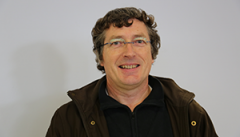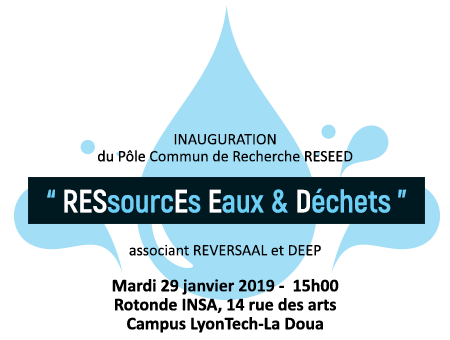
Research
RESEED: Meeting the sanitation challenges of the future
Creating the wastewater treatment plant of the future is the challenge facing the RESEED (RESsourcEs Eaux et Déchets - Water and Waste Resources) joint research centre, made up of the laboratoire DEEP (Waste, Water, Environment, Pollution) at INSA Lyon and the REVERSAAL (Reduce, Reuse and Recover Wastewater Resources) research unit at IRSTEA (National Institute for Research in Science and Technology for the Environment and Agriculture), which will open on 29 January at INSA Lyon.
Meeting with Jean-Luc Bertrand-Krajewski, director of the laboratoire DEEP at INSA Lyon and member of RESEED, which works on the development and deployment of innovative eco-technologies for the management of wastewater and rainwater.
Wastewater: a source of energy to be recovered
Greenhouse gas emissions, persistent residues of micropollutants, energy consumption... Wastewater treatment has implications for the environment, and with 21,631 wastewater treatment plants1 in France in 2017, imagining the wastewater treatment plant of the future has become an emergency. All the more so as these water treatment platforms are full of unused energy potential.
‘It is time to treat wastewater as a renewable energy source, rather than as something to get rid of. Recovering this energy, by transforming sludge from wastewater treatment plants into biogas or by using the phosphorus contained in the sludge, for example, would enable us both to improve the quality of the treated water and also to reduce the ecological impact of these plants by reusing their own waste’, explains Jean-Luc Bertrand-Krajewski.
The use of digital technologies could bring real progress in research: managing flows and analysing the environment in real time using sensors, for example, could lead to more sustainable processes and better treated water.
Structuring to meet future challenges
‘Two of the main areas of expertise of the laboratoire DEEP concern rainwater and the impact of the pollutants it carries, as well as anaerobic digestion. The IRSTEA centre in Lyon-Villeurbanne is an expert in wastewater treatment. It was important to join forces because the water cycle requires a comprehensive strategy: pooling our skills and tools leads to more efficient results than in small research units’, adds the director of the laboratoire DEEP.
The joint research centre, which organises its work along three lines - ‘Reducing the flows emitted (water, materials and pollutants) using appropriate treatments and/or upstream actions’, ‘Reusing’ and "Recovering and developing resources’, resulted from the long-standing relationship between the two entities specialising in water. Structuring itself in this way offers more visibility for research that fits in with European and national policies.
‘The members of DEEP and REVERSAAL were already working together before the creation of RESEED, but we wanted to provide a framework for these collaborations based on multidisciplinary skills. In addition, we are fortunate to be able to conduct our research on different scales, and in particular on the IRSTEA experimentation platform backed by the Feyssine wastewater treatment plant, which is a godsend for RESEED researchers’, explains Jean-Luc.
Through different projects involving twenty-nine INSA staff and sixteen IRSTEA staff, RESEED is embarking on a new era that will contribute to making sanitation cleaner and more sustainable.

1 Source: http://assainissement.developpement-durable.gouv.fr/index.php
Keywords (tags)
News list
« L’IA générative nous oblige à regarder la réalité des pratiques étudiantes en face »

